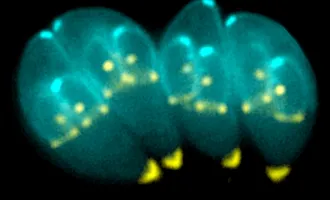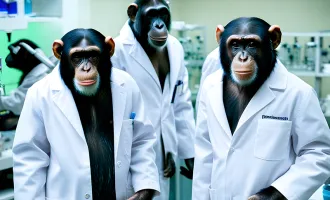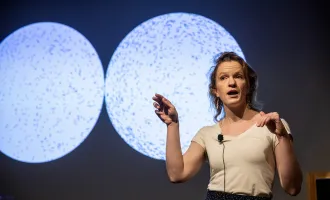QB3@953: Hatching Life Sciences Startups in UCSF’s Backyard
If you’ve got an idea for a startup and a spare $800, you might consider renting space in the new QB3 incubator building.
QB3@953, which opened this fall at 953 Indiana St. in San Francisco, is designed to support biotech startup companies through the growing pains of launch and development.
“Our fundamental belief is that the combination of entrepreneurship and great science is the most powerful force that can change the world for the better that we’ve ever discovered. So our goal is to give entrepreneurial scientists the tools they need to be able to create successful startup companies,” said Douglas Crawford, the associate director of QB3.
That $800 rents you eight feet of lab bench space per month. That may seem tiny to some, but not to Crawford. As he showed off a single occupied lab bench, he announced, “this eight-foot bench is the world headquarters of BioA2Z.”
So, what are those critical tools for success? A balanced mixture of mentorship, resource allocation and peer-to-peer support.
Located in the trendy Dogpatch neighborhood, QB3@953 blends in beautifully with the residential surroundings. The office space is sparsely but tastefully decorated, with just a splash of color to make the environment chic but cozy.
The three lab areas are large and spacious, with room for startups to expand and shrink as necessary. Already, 24 companies have committed to space, with room for approximately 10 more startups. A brand-new building in a trendy neighborhood isn’t sufficient to draw entrepreneurs, though, and that is where the innovative approach to this new incubator comes into play.
Learning from seven years of launching other QB3 incubators, Crawford and his team have once again improved upon their own model. Startups can now subscribe to a core facility with shared equipment — that means each startup is spending less money on equipment they don’t consistently use, and the facility reduces the overall redundancy of equipment among the labs.
For example, instead of each lab having to throw down several grand for a PCR machine they are only going to use a couple of times a month, labs share the machine provided in the core facility. QB3@953 also reduces the logistical burden of ordering items in bulk, by providing a storeroom where startups can grab one box of gloves instead of ordering a whole carton.
There’s even a deli fridge from which startups can grab one bottle of cell media. As an added bonus, QB3@953 has negotiated prices for all these items comparable to the prices for industry giants like Gilead, and they pass the savings on to the startups.
In essence, “Because you only use what you absolutely need and the unit is so small, your costs are very small, so we allow people to create startups on a shoestring,” Crawford explains.
QB3@953 has other advantages, too, such as flexible lease terms, three types of office space (workspace, cubicle, personal office) and the lowest rent in town ($800/month for bench space). My personal favorite is the technical science support staff, who can handle the essentials of your lab work (such as passaging cell lines) while you are away, freeing you to present your work at a conference or meet with investors.
Crawford also points out the value of working alongside other startup companies and the collaborative nature of the incubators.
“When [entrepreneurs] come to look at the incubator, they ask only about two things, the price of the space and what equipment they get access to,” he said. “After they are here, they find the most dominant reason to be here is culture. But if I tell them that in advance, they’ll never believe me.”
With all this support, it is hard to imagine companies failing — and they don’t. When I asked what the failure rate of the companies was, Crawford surprised me by saying they average only one or two companies failing a year, out of a total of 60 to 70. He then proceeded to rattle off a number of success stories, ranging from selling the company, to larger enterprises, to becoming fully fledged independent companies.
The QB3 incubators are always recruiting fresh faces with innovative ideas and the entrepreneurial spirit, and where better to recruit these talented individuals than from their next-door neighbor, UCSF?
“The job market for graduate students and postdocs in the life sciences is tough, to say the least. One of the most effective ways that grad students and postdocs can correct that problem is to create their own job,” said Crawford.
UCSF and QB3 have partnered up to prepare graduate students and postdocs for that future. Offering seminars and mentorship programs like “Idea to IPO” and the “Startup in a Box” Small Business Innovation Research (SBIR) workshop, UCSF and QB3 are committed to helping graduate students and postdocs transition into the entrepreneurial world.
The idea is to utilize the academic environment to help nurture networking amongst scientists and entrepreneurs and get students and postdocs excited about startups as a career possibility.
So if you have an idea and $800 in your pocket, check out QB3@953. It just may be the perfect place for you to launch your new career.
Check out the QB3 website at http://qb3.org/ or the Startup in a Box SBIR workshop at http://qb3.org/startups/box.


